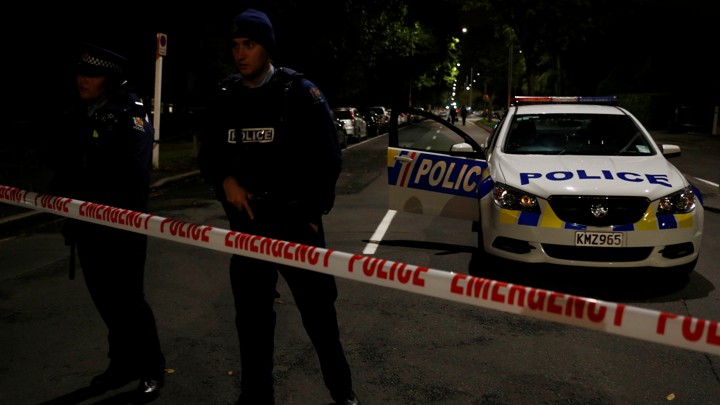Graeme Wood
 I have just read the manifesto written by the alleged killer of almost 50 Muslims in Christchurch, New Zealand. I can think of more pleasant ways to spend a Friday morning, such as nursing a throbbing case of pink eye, or seeing how long I can hold my palm on my hot plate without screaming. But the evaluation of nauseating ideological statements is a specialty of mine, and regrettably, today I am once again on duty.
I have just read the manifesto written by the alleged killer of almost 50 Muslims in Christchurch, New Zealand. I can think of more pleasant ways to spend a Friday morning, such as nursing a throbbing case of pink eye, or seeing how long I can hold my palm on my hot plate without screaming. But the evaluation of nauseating ideological statements is a specialty of mine, and regrettably, today I am once again on duty.
The sole virtue of “The Great Replacement,” a 78-page Microsoft Word document containing poetry and illustrations, is its clarity. It provides a catechism about the intentions of its author, as if to preempt the usual questions that follow atrocities of this kind. (Certain lines are written in an ironic, messing-with-you tone, but they are easy to detect if you spend enough time reading this stuff.) The author is a white Australian and wishes to hasten a civilizational war. His model is Anders Behring Breivik, the Norwegian neckbeard who murdered 77 people, mostly liberal teens at an island retreat, in 2011.
The civilization that most offends him is Islam, because of its attempt to colonize the West through immigration and philoprogenitiveness. He hates, most of all, those Muslims who are peaceful. “The unarmed invader is far more dangerous to our people than the armed invader,” he says. “We have no real idea on how to deal with them, we are unable to attack them or fend them off in any meaningful way.” He is ideological but, like Breivik, not meaningfully religious, and comes close to denying that he is even Christian.
That’s it. To examine the document more carefully is about as useful as stirring and examining the killer’s scat. Not all manifestos and ideological documents are this mediocre or written in such a repulsively casual tone. (“Q: You are a bigot, racist, xenophobe, islamophobe, nazi, fascist! A: Compliments will get you nowhere.”) The Islamic State’s statements, for example, were written in a repulsively formal register, often with original poetry and allusion to rich intellectual traditions. The Unabomber, too, displayed erudition and an almost dainty concern for citation and detail. (In his last book, a prison manifesto, he even cited me.) The killer in this case seems to have lacked originality, even cribbing his jokes from fellow sewer-dwellers on the internet. Already the internet is being scrubbed of his manifesto. I predict that within days it will be easy to find again, but that no one will bother reading it, because it is simply stultifying, and not bracing even for the skinheads and tiki-torch marchers who agree with it in principle.
Of course, even a mediocre manifesto will attract interest, both prurient and legitimate. In extremist manifestos, “there is a potency in the combination of words and action,” J. M. Berger wrote here just a few weeks ago, that fascinates people, both analysts and believers. Some of these documents contain wicked brilliance that catalyzes violent acts through sheer force of imagination. Berger counts more than 200 deaths at the hands of fans of The Turner Diaries, a 1978 anti-Semitic and racist thriller. The Islamic State has killed many more, and although it has never published a manifesto, untold numbers of foreign fighters began their journeys by downloading an ISIS-produced document outlining the beliefs that a Muslim must hold, and the actions those beliefs require. These manifestos sometimes matter a great deal.
What we should learn as this particular manifesto is forgotten is that even if specific texts prove unmemorable, the potency of ideas is enduring and chronically underestimated. Is there any doubt that the ideology that inspired the Christchurch terrorist is a global pestilence, and that any response that fails to apprehend it as an ideology is inadequate? We already see an understandable curiosity about websites the killer might have visited, the fact that he live-streamed his crimes, and his references to memes and public figures.
I am reminded of early phases of analysis of ISIS, when sympathizers flooded Twitter with jihadist memes and jokes, and in some cases even planted obviously fake claims that they had been radicalized by non-jihadist Muslim public figures in the West. The confusion sown in those early days contributed to a failure to realize that at its core, ISIS had a very non-ironic set of beliefs, accompanied by ironic memes and worldly mechanisms for dissemination. When the Christchurch killer departs from his jocular, message-board tones, he refers to historical figures and events, not always the ones that have engendered Pepe-like memes for the internet’s right wing. (He refers three times to the English Nazi-sympathizer Oswald Mosley, a figure known to every fascist but not to every keyboard warrior on 8chan for the laughs.) This fascist core is attended by a bodyguard of casual irony and disdainful, in-joke humor. The tone is just a style, and a phenomenon of our times. But the core is an enduring enemy of civilization. The killer sees it, rightly, as historically continuous with mid-20th-century fascism. The survival of this ideology in any form should unnerve us all.
No comments:
Post a Comment